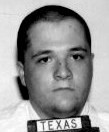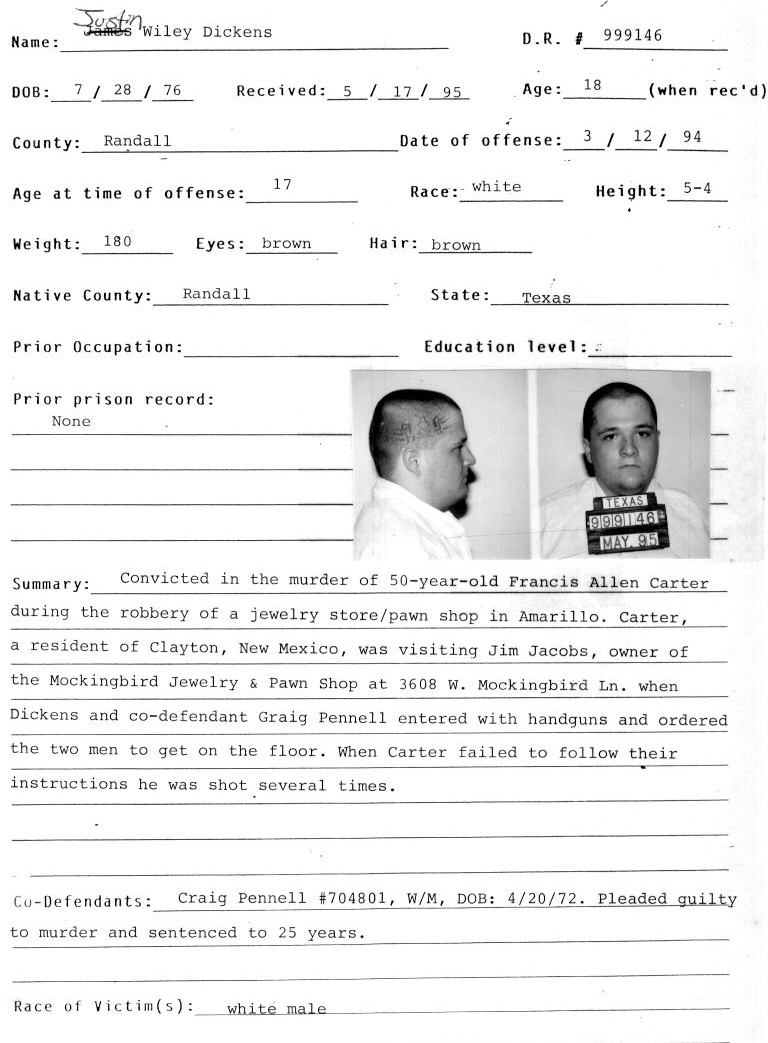Dickens was convicted in the March 12, 1994,
murder of 50-year-old Francis Allen Carter, a schoolteacher from
Clayton, N.M. Carter was visiting with the owner of Mockingbird
Jewelry and Pawn Shop when Dickens entered to rob the store and
ordered Carter and the owner to the floor. Carter was shot twice
while the owner ran out the back door and alerted police.
"He was a drug-dealing tattoo
artist who used LSD. I just wanted to be like him," Mr. Dickens
remembered. "I was like his dog, you know. Dallas accepted me. He
accepted me."
Acceptance assumed supreme importance to a
teenager who hardly stood 5 feet tall, whose father had
disappeared and whose absentee mother nurtured her son by teaching
him to shoplift.
The dealer and the kid enjoyed some fun times,
at least until Mr. Dickens – striving to repay a debt to his
criminal mentor – shot a beloved high school teacher between the
eyes. After that, Mr. Moore was free to move on to other states
and additional felonies.
Mr. Dickens went to prison under a death
sentence.
His age at the time of the murder – 17 –
ultimately placed him among the 73 condemned men hoping for what
amounts to a mass commutation from the U.S. Supreme Court.
Today, justices will hear arguments on the
constitutionality of capital punishment for crimes committed under
the age of 18.
But for that, Mr. Dickens' 10-year-old case
would long ago have faded from attention, just another West Texas
armed robbery with a bloody and tragic ending. At best, it
provided an unnecessary lesson in the stupidity of combining drugs,
guns, fear, bad influences and deadly ineptitude.
It also bore the saddest of ironies: He killed
the man he should have met.
If only Chicken Dickens had come under the wing
of the inspirational teacher instead of the trailer-park crime
boss, there might well be one less ill-fated loser in prison today.
But that would require the sort of good fortune and youthful
application that never attached to Mr. Dickens.
He is 28 now and has spent the last third of
his life locked up. His hairline has begun to recede, revealing
the image of a hooded executioner inked on his right temple.
"I wasn't a bad person," he said in a recent
prison interview. "You may not believe that."
Many don't, including the man who prosecuted
him, Randall County District Attorney James Farren: "Justin Wiley
Dickens would kill you and your family if you were between him and
something he wanted."
Destined to offend?
Instead of inherent malevolence,
however, Mr. Dickens' defense attorney saw a pre-ordained doom.
"This kid," Amarillo lawyer Rus Bailey said, "never
stood a chance from the day he was born."
The trouble started even before that.
His mother, Vicky Raelene James, decided early
in her pregnancy that she didn't want to have a second child. "I
used methamphetamine to try to abort," she testified at his 1995
trial.
Released in June from prison for robbery, Mrs.
James initially agreed to be interviewed about her son, only to
change her mind. Later she agreed again, but changed her mind once
more.
"I don't blame her," Mr. Dickens said of his
mother's effect on his fate. "She was a good mom when she wasn't
high. But she had her own addictions."
Mainly they were heroin and cocaine. She was
arrested a dozen times or more; her children were in and out of
foster homes. When her son was 10, she tried to commit suicide by
slashing her wrists with a broken mirror.
A childhood memory from Mr. Dickens: "Me and my
mom started shooting dope [cocaine]. My mom, she would run the
streets, shoplifting from stores. She'd steal leather jackets,
watches, Monistat, anything. I was basically a decoy. I'd walk
around the store and be a distraction."
The paternal side of the family had problems as
well. Mr. Dickens' father didn't hang around long, but a
stepfather, Geary James, took over.
He could be a doting dad, trial testimony
showed, except when he was a doping deadbeat. Once, as Mr. James
sat reading a story to young Justin and his sister, members of the
Mexican Mafia dropped by to deliver a death threat related to
money owed for marijuana sales.
When he was in sixth grade, Mr. Dickens said,
"I walked in on my stepdad shooting up in the garage."
(Mr. James is currently serving a prison
sentence on drug charges. Earlier this year mother, stepfather and
son were all in prison at the same time, though in different
institutions.)
By the time he was 14, Mr. Dickens said, he was
living on his own. He got the nickname "Chicken," he said, because
of his short stature and bantam personality. He huffed gasoline
and used LSD. His theft of marijuana from a motorcycle gang earned
him a pistol-whipping.
Then he met Mr. Moore, who at age 32 was fresh
off a 10-year stretch for first-degree robbery in Missouri.
"He was like a cult figure, an icon," Mr.
Dickens recalled. "Me and Dallas became tight."
Mr. Moore gave his new protege a gratis tattoo
on his torso – a depiction of a skull wearing a derby decorated
with a swastika. When Mr. Moore married his longtime girlfriend,
they took Mr. Dickens along on the honeymoon in the bridal suite
of an Amarillo motel.
A fraternal bond
"He seemed like the big brother
I never had," Mr. Dickens said. "He was a people person."
Somewhere in all this bonding the two of them
developed a steady habit of injecting cocaine.
"That's when the bottom fell out," Mr. Dickens
said.
It fell hardest when Mr. Moore's wife and Mr.
Dickens absconded with a thousand dollars worth of Mr. Moore's
cocaine and had a private party. Mr. Moore showed his displeasure
by knocking Mr. Dickens around with the barrel of a handgun and
demanding repayment.
"He had a ski mask hanging on the wall," Mr.
Dickens said. "He pointed to it and said, 'When I get in trouble,
I handle my business with a pistol.' "
But Mr. Dickens had no pistol. So he went to
his great-grandfather's house, ate some "home-made sticky buns,"
then strode into the bedroom and secretly lifted a .357.
"The best friend I ever had in the world," he
said. "I betrayed him and stole his gun."
An acquaintance drove as he searched for a
place to rob. They had been drinking beer, taking Valium and doing
coke. Pantera's Cowboys From Hell screamed from the pickup
truck's speakers. "Here we come," the song goes, "reach for your
gun."
On Amarillo's south side, they stopped at
Mockingbird Jewelry & Pawn. Mr. Dickens walked in alone, with the
gun in a pocket of his Oakland Raiders jacket. It was 6 p.m. on
March 12, 1994.
Two men stood talking at the shop's counter –
the owner and a jewelry salesman, Allen Carter of Clayton, N.M.
Mr. Carter was a Vietnam veteran who had grown
up dirt poor. "He started working to help support his family when
he was six years old," said Mr. Farren, the district attorney.
At age 50, he dealt in jewelry only as a
sideline. His real job, and deep calling, was teaching English at
Clayton High School.
He had taught there for 23 years, sponsored the
student newspaper and was named teacher of the year in 1986. He
was the sort of teacher who once took out a personal loan to help
a promising former student pay college tuition.
"Allen was just one of those individuals – he
was like a magnet," said Clayton principal John Burgess. No one
failed Mr. Carter's class, Mr. Burgess said, because he worked
with every student – even the most troubled – as much as necessary.
"He would not accept failure."
Added colleague Barbalee Blair: "He really,
really had a way with kids. He was a fierce, nail-'em-to-the-wall
kind of guy who spoke to them in their language."
Then he encountered Mr. Dickens, a junior-high
dropout pointing a loaded Smith & Wesson.
"Get on the floor," Mr. Dickens ordered. "Do
what I tell you [or] I will kill you."
The shop owner and Mr. Carter complied. This is
Mr. Dickens' version of what happened next:
Mr. Carter rushed him and began punching him.
Mr. Dickens dropped into a fetal position against the wall. Mr.
Carter grabbed for the gun and it went off, hitting him in the
head.
The owner of the pawnshop was able to flee. He
testified that he did not get a clear view of Mr. Dickens shooting
Mr. Carter.
Prosecutor Farren said physical evidence,
including blood spatters, did not support Mr. Dickens' account. "It's
a lie," he said.
It's also an important legal distinction; if
the shooting were accidental, it would not have been capital
murder.
Clayton principal Burgess said he can well
imagine Mr. Carter trying to persuade yet another wayward youth to
turn his life around. "He would try to talk him out of it," Mr.
Burgess said. "But he would not try to physically overtake him.
That would be out of character."
When news of his brutal death reached Clayton,
the students couldn't believe it. "The kids were crushed," Ms.
Blair said. "We've had other bad things. But I've never seen them
like this."
Back in Amarillo, a friend testified, Mr.
Dickens bragged about what he had done. "He thought it was like
kind of funny, I guess," she said.
Mr. Dickens has this explanation: "I just felt
an incredible sense of shame, and the only way to play it off was
act like Mr. Bigshot."
The prosecutor had another interpretation: "He
wasn't 'Little Chicken' anymore. He was finally a gangster."
When one of Mr. Dickens' friends turned him in,
Mr. Moore, as a veteran of criminal justice problems, had some
advice. "He said: 'Take it easy. You're young; you'll be out in 15
years,'" Mr. Dickens recalled. "He said, 'They can't touch you.' "
A decade later, a new generation at Clayton
High School walks past an oak tree planted in Mr. Carter's memory.
"The kind of kid who killed him," principal Burgess said, "would
be the kind of kid that Allen Carter would save."
'Shame and sorrow'
From death row, Mr. Dickens
watches as his appeals are slowly exhausted. The most recent
denial, in June, came from the federal court in Amarillo. And he
was recently diagnosed, he said, with Hepatitis C – not an
unlikely occurrence after years of needle drug abuse.
He said he is sorry about Mr. Carter's death
but does not believe he deserves lethal injection.
"I feel a lot of shame and sorrow. It haunts me
to know that I killed a man," he said. "I know in my heart I'm not
a cold-blooded murderer. There are many people who share the blame."
One of those, in Mr. Dickens' mind, is Mr.
Moore.
After the murder, Mr. Moore moved to New Mexico,
where he turned over a new leaf by committing burglary, kidnapping
and jail escape. Now on parole, he gave only a brief interview
about the teenager who idolized him.
"He was just a young kid, trying to step up to
the plate and trying to impress people," Mr. Moore said. "He got
caught."
Such a response doesn't surprise Mr. Dickens. "Looking
back, I know he never had no love for me."
But even facing execution, Mr. Dickens can't
quite abandon all affection for the one who took him in, no matter
how badly it all turned out.
"I still love him," he said. "And I still hate
him."


